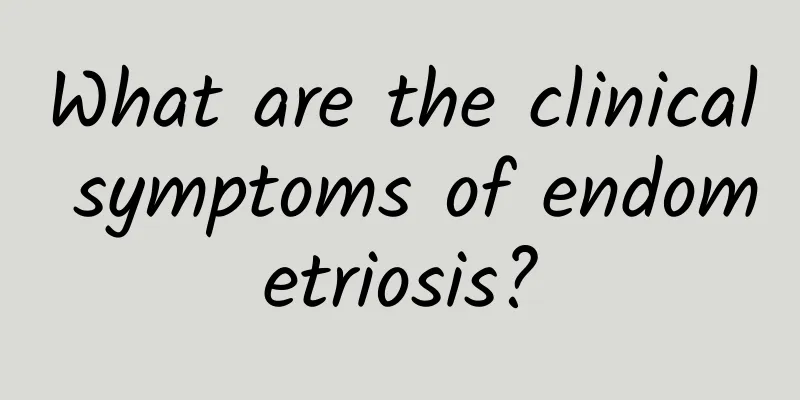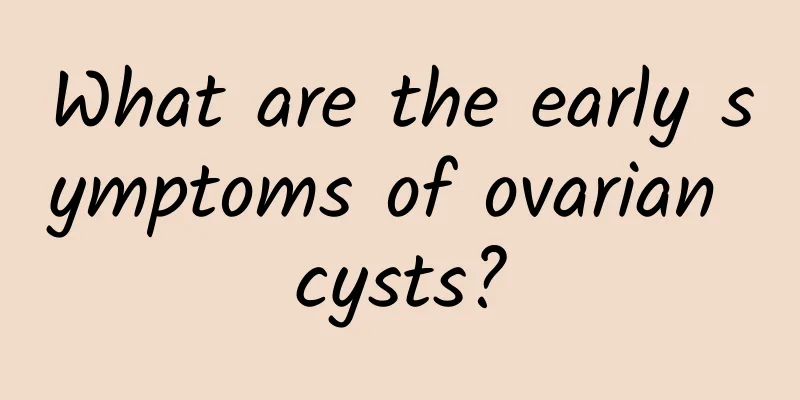What are the clinical symptoms of endometriosis?

|
Endometriosis has a serious impact on women's health, but endometriosis is similar to other gynecological diseases. So, what are the clinical symptoms of endometriosis? The clinical manifestations of endometriosis are: 1. Infertility: About 50% of endometriosis patients are accompanied by infertility. Among patients with unexplained infertility, about 30-40% suffer from endometriosis. Endometriosis causes infertility, which is often caused by pelvic masses, adhesions, fallopian tube blockage, poor follicle development or ovulation disorders caused by the disease; once pregnant, the ectopic endometrium is suppressed and atrophies, which plays a good role in the treatment of endometriosis. Some cases of habitual abortion are caused by endometriosis. 2. Dysmenorrhea: The clinical feature of endometriosis is progressive dysmenorrhea, which is a common and prominent feature. Most of them are secondary, that is, since the onset of endometriosis, patients complain that they did not have pain during menstruation in the past, but dysmenorrhea began to occur at a certain period, which can occur before, during and after menstruation. Some dysmenorrhea is severe and unbearable, requiring bed rest or medication for pain relief, and even causing pain to "roll on the bed" or hit the head. The pain often worsens with the menstrual cycle and disappears at the end of menstruation, but domestic reports show that about 21% of patients do not have dysmenorrhea. 3. Cyclic rectal irritation symptoms: The progressively aggravated cyclical rectal irritation symptoms are rarely seen in other gynecological diseases and are the most valuable symptoms for diagnosing this disease. The rectum, anus, and vulva are distended, painful, and feel tenesmus, and the frequency of bowel movements increases. As the lesion gradually worsens, the symptoms become more obvious, and disappear after menstruation. 4. Menstrual irregularity: Endometriosis patients often have shortened menstrual cycles, increased menstrual flow or prolonged menstrual periods, indicating that the patient has ovarian dysfunction. Menstrual irregularity can be used as a diagnostic reference, but it has no value in differential diagnosis. |
<<: Does pelvic inflammatory disease affect pregnancy?
>>: What are the reactions to ovarian cysts?
Recommend
What causes uterine fibroids? Top 10 foods to avoid when you have uterine fibroids
What causes uterine fibroids? Uterine fibroids ar...
What fruits and vegetables to eat to prevent miscarriage
Abortion is very painful for expectant mothers, w...
Experts analyze the specific manifestations of different symptoms of pelvic inflammatory disease
Pelvic inflammatory disease is a difficult and co...
How to treat cervical erosion, 2 treatments and 4 cares for cervical erosion
If cervical erosion occurs, drugs can be used for...
What should I do if my vaginal discharge is like yogurt? Check it out in time
It is not normal for vaginal discharge to be like...
What to do if you suffer from Bartholinitis after abortion
Bartholinitis, literally means an inflammation of...
Early symptoms of ectopic pregnancy are often accompanied by nausea and vomiting
Many women mistake the early symptoms of ectopic ...
What happens if you have severe cervical erosion? What should you do?
What happens if you have severe cervical erosion?...
How to eat ketogenic diet without getting weaker and weaker? The 6 major body types in traditional Chinese medicine can eat ketogenic diet to be healthy
"Doctor, is the ketogenic diet suitable for ...
Choose the right food! You can lose weight even if you eat three meals a day
Many people must have had the idea that "you...
What causes missed abortion? There are 5 factors that affect it
Missed abortion is caused by congenital abnormali...
Daily care for patients with congenital absence of vagina
Congenital absence of vagina can be divided into ...
Why does the uterus grow fibroids after cesarean section? What is the cause of uterine fibroids after cesarean section?
Why does the uterus grow fibroids after cesarean ...
What are the causes of uterine fibroids? Common hazards of uterine fibroids
Submucosal fibroids account for about 10% of uter...
How to treat severe cervical erosion in women? 4 best treatments for severe cervical erosion in women
In life, cervical erosion is the most common gyne...









